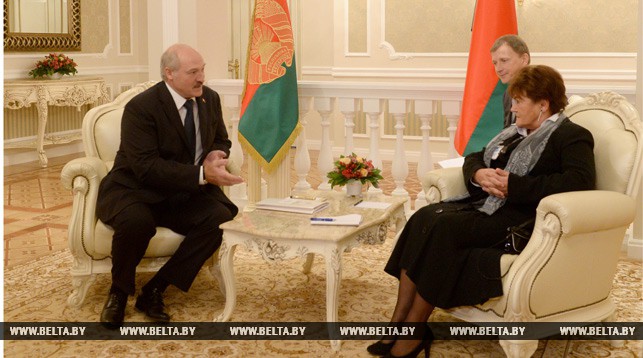Belarus held presidential election between 6 and 11 October 2015. Almost seven million voters were eligible to cast ballots at 6,129 polling stations during the five day early voting period and election day on 11 October. This update summarises important events that occurred following the close of polls on 11 October and through 16 October, when the official results were announced.
The main voting day, as well as the early voting period, was observed by local independent observer groups Right to Choose-2015 (R2C), Human Rights Defenders for Free and Fair Elections (HRD), and the youth initiative Election Observation Theory and Practice (EOTP). R2C deployed observers at 672 polling stations during the early vote period, and monitored 642 polling stations during election day.
HRD conducted observations at 400 polling stations during the early voting and election day period. Journalists and citizens also monitored and reported their observations on social networks, via the mobile phone observation app Vochy and the Ushahidi based crowdsourcing observation site Electby.org.
Key Points
-
The HRD and R2C election observation missions challenged the validity of the election results. They described the election as ‘non-transparent, not free and non-democratic’, citing evidence of both turnout and vote count manipulations. Over the course of early voting and election day, R2C observers filed 900 complaints and reported 1,573 incidents, many of them available for review on the crowdsourcing platform Electby.org. Amongst the most pressing election day problems noted by R2C and HRD observers was a lack of transparency and verifiability of the vote count process and final results.
-
In a joint statement the OSCE Office for Democratic Institutions and Human Rights (OSCE/ODIHR), the OSCE Parliamentary Assembly (OSCE PA) and the Parliamentary Assembly of the Council of Europe (PACE) stated that problems with the vote counting and tabulation “undermined the integrity of the election.”
-
The Central Election Commission (CEC) of Belarus announced the official presidential election results: Alexander Lukashenko – 83.47 percent, Tatsiana Karatkevich – 4.44, Sergey Gaidukevich – 3.30, Nikolay Ulakhovich – 1.67, and Against All – 6.32 percent. Turnout announced by the authorities was 87.22 percent, of which 36.05 percent were attributed to the early vote period.
-
Tatsiana Karatkevich’s team announced she and her team would “fight for their votes” and appealed the election results to the CEC using R2C and HRD findings as evidence. Karatkevich claimed her campaign received between 20 and 35 percent of the vote. Karatkevich’s appeal was rejected by the CEC on 16 October. Karatkevich also announced her plans to continue building on her recent success. She and her team plan to organise a Nationwide Development Forum “For Peaceful Changes,” and began forming of a list of candidates for parliamentary elections.
-
Around 200 people attended a peaceful protest against the conduct of the election. Human rights defenders reported that five anarchists were detained near where the protest occurred.
-
United Civil Party Chair Anatoly Lebedko, former presidential candidates Nikolay Statkevich and Vladimir Neklyaev held a press conference in Minsk. They demanded non-recognition of the election results by the international community and announced the launch of the “Power to People” campaign, a new effort to fight for economic reforms, free elections and the preservation of the statehood and independence of Belarus.
Election Results
On 16 October the CEC announced its official presidential election results: Alexander Lukashenko – 83.47 percent, Tatsiana Karatkevich – 4.44 percent, Sergey Gaidukevich – 3.30 percent, Nikolay Ulakhovich – 1.67 percent, Against All – 6.32 percent.
According to official data, election turnout reached 87.22 percent, of which 36.05 percent was attributed to early voting. Officially this was the highest early vote turnout in Belarusian history.
HRD and R2C election observation missions questioned the validity of results and called the election non-democratic, citing evidence of both turnout and vote count manipulations. R2C stated that the presidential election “was not free and not fair, vote counting was conducted in a non-transparent manner”. HRD concluded, “the election process did not meet a number of key international standards for democratic and free elections.” The combined statement of OSCE/ODIHR, OSCE PA and PACE also raised questions as to the validity of the process, and particularly the vote count.
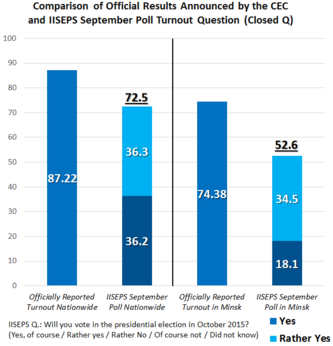
The official results provided by the CEC diverge significantly from the results of an independent poll conducted by the Independent Institute of Socio-Economic and Political Studies (IISEPS) in mid-September regarding voter intention. As the charts illustrate, the election turnout and results nationwide and, particularly in Minsk where both expected turnout and Lukashenko's support are lowest, and are considerably different than the public sentiment a month before the election.
It should be noted, the most likely voters are strongly pro-Lukashenko, and thus the final vote percentage for Lukashenko would be expected to rise somewhat as a result of non-Lukashenko voters avoiding the polls. IISEPS noted that when extrapolating these results to the turnout of 80 percent, for Lukashenko would vote 56 percent, and for Karatkevich 22 percent.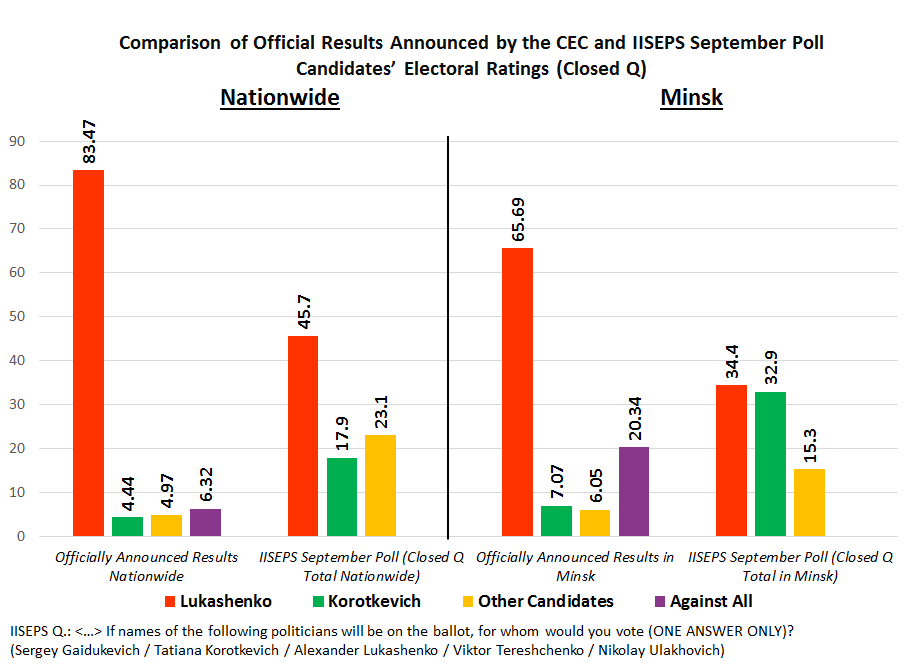
Prior to announcement of the official election results, three exit polls were released. The exit polls were conducted by the Youth Laboratory of Sociological Studies, the National Academy of Sciences, and Evraziyskiy Barometr. All focus groups were either contracted or conducted by structures tied to the authorities, thus making their independence and stated results suspect. Each of these polls forecast Lukashenko would receive more than 80 percent.
Election Observation and Reports on Non-Transparent Vote Count
Domestic independent observers negatively assessed the election. R2C stated that the presidential election “(was) not free and not fair, vote counting was conducted in a non-transparent manner, and the results announced by the CEC are not trustworthy. All negatives practises that previously were criticised by national and international observers were continued this campaign.”
HRD observers concluded, “the election process did not meet a number of key international standards for democratic and free elections. This was due to the lack of equal access to the media for all candidates, the lack of impartiality of election commissions, use of administrative resources in favour of the incumbent, numerous facts of coercion of voters to participate in early voting, and the closure of some election procedures for observers. The most important reason for criticism is the lack of transparency of the vote count, which does not allow to consider the election results as a reflection of the will of voters.” In addition, both R2C and HRD campaigns developed recommendations to increase elections transparency.
During the main election day, R2C observed 643 polling stations. During the entire voting period R2C observers reported 1,573 incidents and filed 900 official complaints.
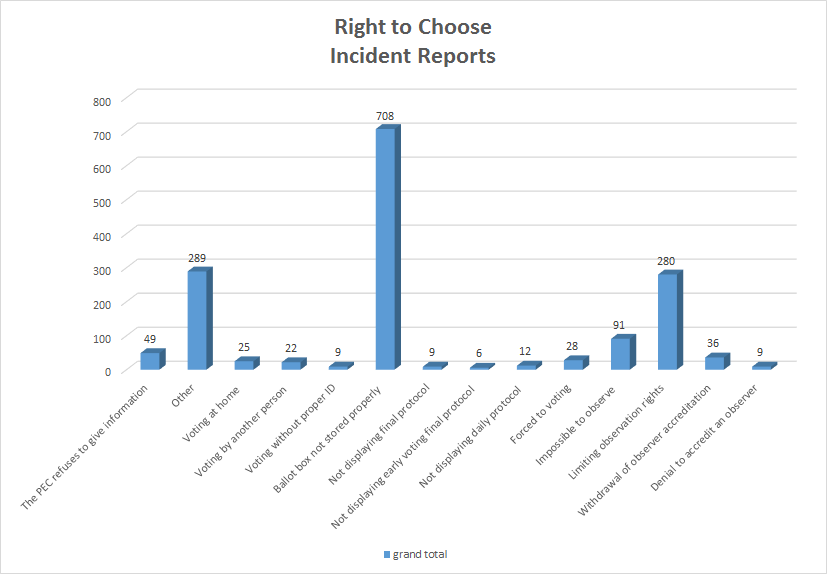
On the main election day R2C reported 419 incidents and filed 509 complaints.

In patterns similar to those noted during the early vote period, R2C observed artificially inflated turnout during the main election day. On 11 October R2C was able to conduct a parallel turnout count at 485 polling stations. At these polling stations R2C counted 374,809 people who voted, while official data indicated 395,863 voters, a discrepancy of 21,054.
In addition to inflated turnout, R2C observers identified several categories of incidents that took place on the main election day including: withdrawal of accreditation of observers, non-transparent vote count, refusal by commissions to provide voter list information and expulsion from polling places when observers asked commissioners to conduct an open vote count.
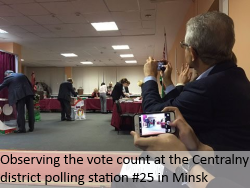
Issues in Vote Counting
R2C observers were present during ballot counting in 633 polling stations. R2C concluded the vote count was not open, and not transparent, and observers were unable to verify vote totals announced by commissions. At 141 polling stations vote counting was conducted without the required separation of ballot boxes by type of vote (early voting, mobile voting and main day voting).
According to HRD observers, more than half of their observers were put in positions that made it uncomfortable to observe the vote count. Seventy six point nine percent could not see what was written on the ballots. For instance, at the Centralny district polling station #25 in Minsk, domestic and international observers could not observe the vote count because of the distance between the ballots and the observers. R2C published a video demonstrating similar problems occurring in another polling station, as well as a series of pictures illustrating such difficult observation conditions.

At polling station #6 of Pervomayskiy district, Minsk, the commission built ‘chair barricades’ so observers could not monitor the count. Even at Minsk polling station #1, where Lukashenko cast his vote, a Naviny.by journalist reported the “vote counting procedure does not differ much” and observers did not see anything.
An anonymous commissioner from Vitebsk shared his vote counting experience with Euroradio. According to him, commission members signed a final report without actually seeing numbers. He witnessed Karatkevich being assigned 80 votes instead of the 581 counted. When the commissioner complained, his job was threatened. On social media, people posted pictures of protocols from polling stations, where observers were allowed to conduct observation.
A Naviny.by reporter, referring to his experience at polling station #63 in Minsk, noted “They have sorted all correctly, but wrote the report ‘as needed’.” In the final report Lukashenko got 11 times more votes than Karatkevich, although the ballot stacks looked similar (please see the picture at left).
An HRD observer from Gomel Soviet district polling station #25 noted the suspicious efficiency of an election commission which counted 2,500 votes in 20 minutes.
Election Assessment by International Observers
International observers from the OSCE Office for Democratic Institutions and Human Rights (OSCE/ODIHR), the OSCE Parliamentary Assembly (OSCE PA) and the Parliamentary Assembly of the Council of Europe (PACE) held a press conference on 12 October in which they released a statement drawing preliminary conclusions.The statement reads, “The 11 October election once again indicated that Belarus still has a considerable way to go in meeting its OSCE commitments for democratic elections…” there are “significant problems, particularly during the counting and tabulation, undermined the integrity of the election.”
Nevertheless, the Belarus CEC expressed satisfaction with the preliminary report noting some positive assessments. The European Union noted the “peaceful environment” in which the election was held. The EU also offered Belarus assistance “in its efforts to bring its election process in line with OSCE commitments and other international standards for democratic elections.” The United States expressed disappointment “that the elections fell significantly short of Belarus’ international obligations and commitments for free and fair elections”.
Sergei Lebedev, the head of the Commonwealth of Independent States (CIS) observation mission stated, “The election met democratic principles and were transparent, open and competitive.” The Shanghai Cooperation Organization (SCO) did not detect “a single violation of the national election laws.”
The Candidates and Other Political Forces on the Presidential Election Results
Tatsiana Karatkevich thanked voters for their support: “To all those, who believe changes in Belarus are possible and are ready to act. Do not believe in deceitful numbers. This is our victory! We are moving forward!”
On 12 October she held a press conference concluding her campaign, during which Karatkevich listed five major achievements of her campaign:
(1) she claims to have actually received 20-35 percent support from society, which will be proven with independent polls in October; (2) her team reached people “who for the last 20 years have not heard what alternative politicians are saying”; (3) the authorities became aware that people cast their votes for changes in Belarus; (4) their team drew attention to Russian plans to build an airbase in Belarus; (5) the campaign brought new faces to Belarusian politics. Karatkevich believes by announcing fraudulent figures “the authorities do not show respect to the people.”
Karatkevich’s team announced they would “fight for votes” and appealed the election results. Evidence of electoral malfeasance collected by R2C and HRD observers provided the basis for Karatkevich’s appeal. Lidia Yermoshina noted that the CEC has final decision on the appeal on the recognition of election results. An appeal can be made to the Supreme Court only if the CEC finds the results invalid.
The CEC rejected the appeal on October 16. CEC Chair Lidia Yermoshina claimed, “It is wrong to claim that acts of observers – are sacred cows and that commissions cannot justify themselves After examining the complaint, it is possible to say that the CEC has no grounds to recognize election results as void”.
Karatkevich also announced plans to organise a Nationwide Development Forum “For Peaceful Changes,” to give everybody an opportunity to voice problems and become a part of the movement for peaceful changes. The recruitment of parliamentary candidates for next year’s election will coincide with the forum.
Sergey Gaidukevich congratulated Lukashenko. He said all presidential candidates enjoyed equal conditions during the election campaign. Gaidukevich also announced his party would be headed by a new person in the near future, because he has led too long and there are too few youth in the party.
Nikolay Ulakhovich recognised the election results. He believes Lukashenko deserved victory, “We perfectly understand that Belarusian President Alexander Lukashenko is one of the greatest patriots of our country. He once again proved his capabilities and showed that today he is irreplaceable on our Belarusian land,” said Ulakhovich.
On 12 October Alexander Lukashenko began receiving congratulations on his re-election. According to his press service, the President of the People’s Republic of China Xi Jinping was the first to congratulate him. Lukashenko also received greetings from Russia President Vladimir Putin as well as the presidents of Kazakhstan, Ukraine, Venezuela among others.

Despite the fact that neither the only democratic candidate Tatsiana Karatkevich, nor other opposition leaders called people to protest, around 200 people came to the street on election eve. Former presidential candidate Andrey Sannikov called participants of the march heroes and thanked them for their dignity and bravery. Human rights defenders reported that five protesters from anarchist movement were detained, and two of them spent a night in a detention centre. In addition, a complaint against 17-year old Egor Skarbnevskiy was compiled by the authorities.
United Civil Party (UCP) Chair Anatoly Lebedko, former presidential candidates Nikolay Statkevich and Vladimir Neklyaev held a press-conference in Minsk. They demanded non-recognition of the election results by the international community. They jointly announced the start of a new campaign “Power to People.” Lebedko explained the campaign will have three directions of work: 1) Statehood and Sovereignty; 2) Free and Fair Elections; 3) Positive Economic Alternative. According to Statkevich, the first street action under the campaign took place on 10 October and the next one is planned for November to coincide with the anniversary of the day 1996 Referendum.
Michael Murphy & Juljan Jachovic
National Democratic Institute
https://belarusdigest.com/?p=1

